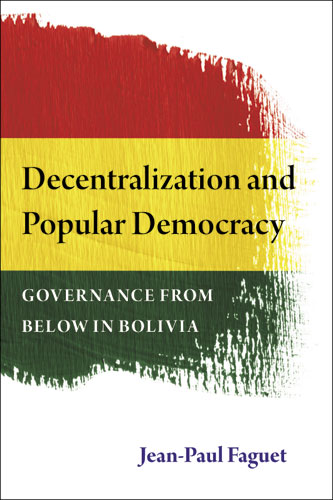Winner of the UK Political Studies Association W.J.M Mackenzie Book Prize 2013, Jean-Paul Faguet’s Decentralization and Popular Democracy looks at how decentralization in Bolivia has improved public services and made government more accountable. Faguet combines broad econometric data with deep qualitative evidence to investigate the social underpinnings of governance, and aims to offer an evaluation of the potential benefits of decentralization and recommendations for structuring successful reform. Juan Pablo Ferrero especially recommends this book to decentralization sceptics.
 Decentralization and Popular Democracy: Governance from Below in Bolivia. Jean-Paul Faguet. University of Michigan Press. 2012.
Decentralization and Popular Democracy: Governance from Below in Bolivia. Jean-Paul Faguet. University of Michigan Press. 2012.
The topic of decentralization has been widely studied, and many academics have argued enthusiastically in favour of the decentralization of the state, its implications, advantages, and expected consequences. Others, in turn, have been more sceptical on the matter. Those argue that while decentralization works well on paper it does not do much in reality. Opponents argue that the dispersal of the functions and powers of government leads to the deterioration of the quality of both policy-making and the administration of public goods because it weakens the strength of the state against the forces of, for instance, market corporations, paving the way for the institutionalisation of corruption, elitism, and clientelism.
The work of Jean-Paul Faguet aims to refute this assumptions with strong evidence from, for many, an unexpected country: Bolivia. Indeed, what makes Faguet’s book valuable and worth reading is the impressive quantitative and qualitative empirical analyses on the processes of decentralization, carried out successfully according to his understanding, by the Bolivian state since 1994. Decentralization became central to institutional reforms in Bolivia following the transition to liberal democracy and was employed in order to close the gap between citizens and the state.
Given the importance of empirical insights for this book, the first three chapters provide detailed analyses of the decentralization reform in Bolivia at a national level, followed by two case studies from within the country. Supported by extensive fieldwork, the author chose two extreme cases of success and failure in municipal performances: Viacha and Charagua. The analysis of the reform at a national level leads to the identification of several common trends and patterns, showing the significant changes in local institutional organisation, investment, participation, and responsiveness to need in the last 20 years in Bolivia (in Chapter 4 the author presents an in-depth analysis of these trends helped by econometric tools). Within these trends two of particular significance stand out: first, the shift in investment from production to human capital formation and primary services implemented mainly by the poorest municipalities; and second, the closer relation between local government decisions and the needs of the people. Chapters 2 and 3 give a dynamic account of how government works in each municipality and the main determinants of their high and low performances.

Once Faguet makes explicit the positive changes implemented in Bolivia under the decentralization reforms and identifies the factors acting on the success and failure cases, he proceeds to discuss the state of knowledge on decentralization in an attempt to challenge sceptic opponents. One of the main conclusions reached by the author at this stage is that those arguing against decentralization and its alleged poor effects depart from the wrong questions. Questions such as ‘what is the effect of decentralization on X?’ assume that such a process will trigger systematic and well-defined effects. Faguet argues the contrary. Decentralization is, for the author, a process that sets in motion local dynamics between actors and key political, social and economic factors, which are mainly determined by the new incentives put forward by the reform. This means that decentralization cannot be appraised by establishing its concrete effects in advance. In fact, it is contingency instead of general mechanisms that lie at the heart of the process of decentralization. Thus, the shift in approach proposed by the author indicates that in order to understand decentralization as a policy process it is necessary to first understand local political and institutional dynamics. This shift points to the understanding of the particular elements that make some local governments perform well and others badly. The shift proposed by Faguet allows him to put forward a framework to understand governance from below, the main factors involved, and the dynamics between them.
Overall, Decentralization and Popular Democracy presents a thorough understanding of the processes of the successful implementation of decentralization in Bolivia, and at the same time its findings truly challenge decentralization sceptics. Yet, the book fails to problematize the theoretical and practical implications that such an analysis has on democracy. That decentralization favours democratisation is assumed rather than questioned. Given that the title of the book includes the idea of popular democracy, it would have been relevant to connect the debate of decentralization and governance from below with its effects on popular democracy, especially taking into account that since 2006 a new political moment has opened up in Bolivian political history with the electoral victory of Evo Morales and the Movement for Socialism. For many, the latter implied the establishment of the first popular democracy, a significant shift towards deepening democracy and redistribution of power in Bolivia, against the oligarchic status quo that hitherto had dominated Bolivian politics and society. To what extent has the process of decentralization studied by Faguet generated the intuitional conditions for the activation of local leaders and communities, and how did this process increas the grassroots mobilisation that eventually set a limit to neoliberal reforms in Bolivia? These questions go beyond the scope of Faguet’s work. However, this book is essential to understanding the path between past institutional reforms and present political transformations that claim to redefine Bolivian democracy today.
———————————————-
Juan Pablo Ferrero is a Lecturer in Latin American Politics at the University of Bath. His interests include social mobilisation, democracy, populism and discourse theory. He is the author of Democracy Against Neoliberalism in Argentina and Brazil: A Move to the Left, forthcoming from Palgrave Macmillan. Read more reviews from Juan Pablo.








1 Comments